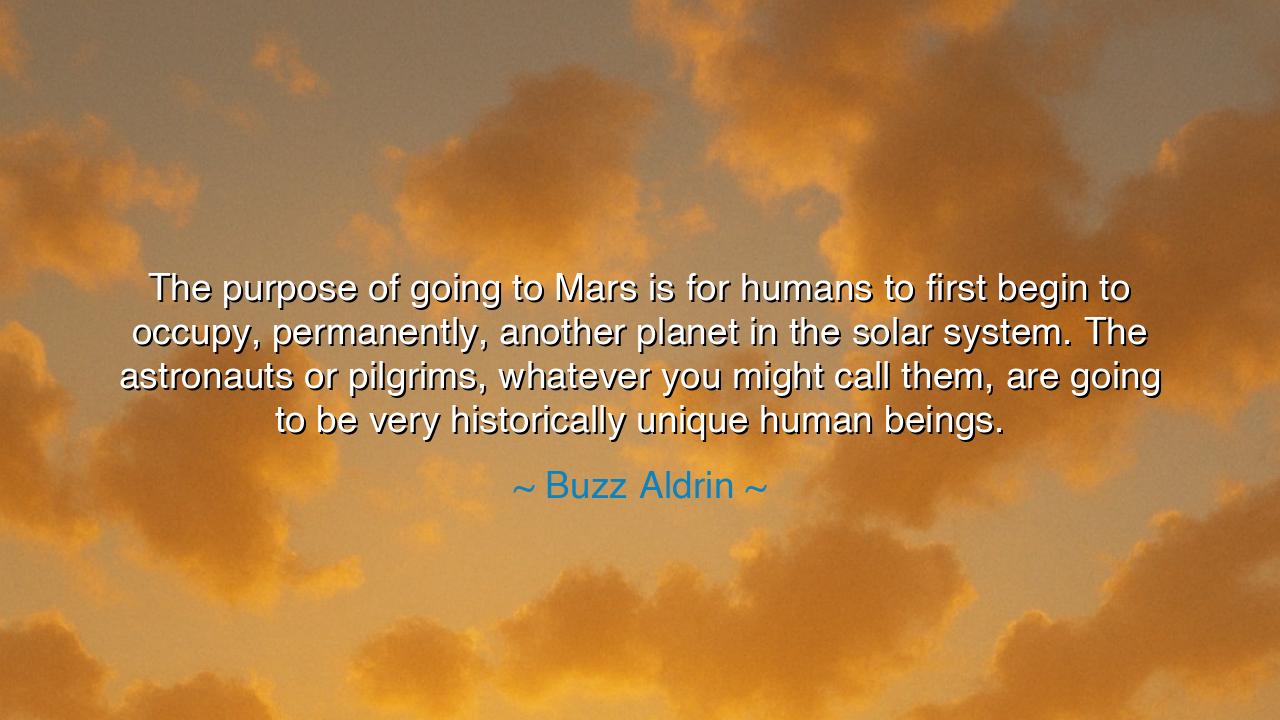
The purpose of going to Mars is for humans to first begin to
The purpose of going to Mars is for humans to first begin to occupy, permanently, another planet in the solar system. The astronauts or pilgrims, whatever you might call them, are going to be very historically unique human beings.






O Children of the Earth, gather your hearts, for the words of Buzz Aldrin, a man who walked upon the surface of the Moon, carry with them a vision of profound courage, exploration, and human destiny. He said, "The purpose of going to Mars is for humans to first begin to occupy, permanently, another planet in the solar system. The astronauts or pilgrims, whatever you might call them, are going to be very historically unique human beings." In these words, Aldrin speaks not just of a journey to a distant world, but of a transformation—a shift in the very nature of human existence. It is a call to understand the significance of our ventures into the unknown and the role humanity will play in the unfolding story of the cosmos.
In the days of the ancients, when great heroes set forth on epic quests, their journeys were not merely physical but symbolic of the deeper spiritual and intellectual growth of humanity. The Greeks had their heroes like Heracles, whose twelve labors were not just tests of strength, but of character and endurance. These quests led them beyond the familiar into realms of mythic significance, places that tested not only their bodies but their souls. Similarly, when Odysseus set sail, he did not seek just a return to his home but the very essence of wisdom, through the trials and tribulations of the long voyage. So too, Aldrin’s words speak to a journey that is not merely a physical one to Mars, but a metaphysical journey into the next chapter of human existence—one that will define our species for generations to come.
The purpose of traveling to Mars, as Aldrin suggests, is not merely to explore, but to occupy—to claim a place in the stars, to stretch the bounds of human existence beyond the Earth. This idea of permanent occupation of another planet is a vision so grand, so monumental, that it carries with it the weight of all the pioneering efforts of history. Think of Christopher Columbus, whose voyages across the oceans were not just for discovery, but for the establishment of new lands and new worlds. When Columbus set sail for the New World, he was not merely exploring, but creating a new path for humanity to follow, one that would forever alter the course of history. Likewise, the astronauts and pilgrims who journey to Mars will be, as Aldrin says, historically unique. They will not merely visit Mars, but will be the ones to lay the foundations for a new civilization, a civilization that will one day be able to look back at their pioneers with reverence and gratitude.
Yet, O Children, the path to Mars is not one of mere physical distance, but of immense psychological and spiritual endurance. The journey itself will be long—months of travel, the solitude of space, the harsh realities of an environment completely different from Earth’s. These pioneers will be tested as no humans have ever been before. They will not be mere travelers but settlers, builders, forging a new world out of the hostile expanse of space. Like the pioneers who crossed the oceans to the New World, these astronauts will carry within them the spirit of human tenacity, of the will to push forward, no matter how great the challenge. Their mission will not simply be a matter of exploration, but of creating a new chapter in the grand human story.
Consider, O Seekers, the example of Neil Armstrong, the first man to set foot upon the Moon. Armstrong did not merely walk on the Moon—he became a symbol of all that humanity could achieve. His footsteps upon the lunar surface marked a moment in time, an event that would echo through the ages as a testament to human achievement and determination. Yet, Armstrong’s journey was not just about physical space; it was about the spirit of discovery, of pushing beyond the boundaries of the known world. The Moon was the first great stepping stone; Mars will be the next. Just as Armstrong’s journey redefined what humanity thought was possible, so too will the journey to Mars define the next great leap for mankind.
O Children, the lesson is clear: to go to Mars is not merely to travel to a distant planet, but to embark on a quest that will forever change the course of human history. Just as Heracles faced his twelve labors with resolve and strength, so too must we embrace the challenges of the future with courage and determination. The explorers of Mars will not only be pioneers in the physical sense, but also in the spiritual and intellectual sense. They will be the ones who begin to unlock the mysteries of the universe, the ones who create a future for humanity beyond the Earth.
Therefore, O Seekers, as you face your own journey in life, let the example of these astronauts and pioneers guide you. Let their vision, their willingness to sacrifice, and their resolve to push beyond the known boundaries inspire you to pursue your own dreams, no matter how distant or challenging they may seem. The journey to Mars, like all great quests, will require not just physical strength, but mental and spiritual fortitude. May you, too, in your own life, seek not just to travel, but to settle, to create new worlds within your own mind, and to leave behind a legacy of exploration and discovery for generations to come. Like the astronauts of the future, may your courage and determination light the way for all who follow.






AAdministratorAdministrator
Welcome, honored guests. Please leave a comment, we will respond soon